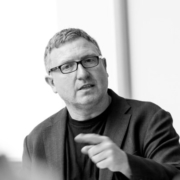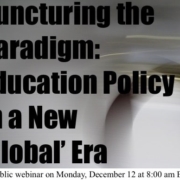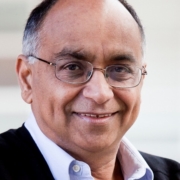Arjun Appadurai
Globalization, Failure & Uncertainty during COVID-19
Today the famed anthropologist Arjun Appadurai joins me to talk about the current pandemic and its impacts on globalization and education. We were supposed to speak in March at a Live Event during the annual conference of the Comparative and International Education Society in Miami, but like most things in life, the pandemic got in the way.
In our conversation, Arjun thinks through the pandemic using some of the ideas for which he’s most known, including the “scapes” of globalization. He also talks about his newest book published last year entitled, Failure, which was co-written with Neta Alexander.
Stay tuned until the end of our conversation where Arjun gives us a peek into some of his newest thinking on ideas not-yet-published! Arjun Appadurai is a Professor at New York University, and at the Hertie School in Berlin. He is a member of the UNESCO Futures of Education commission.
Citation: Appadurai, Arjun, interview with Will Brehm, FreshEd, 198, podcast audio, May 11, 2020. https://freshedpodcast.com/arjunappadurai/
Will Brehm 2:21
Arjun Appadurai, welcome to FreshEd.
Arjun Appadurai 2:23
Thank you very much, Will.
Will Brehm 2:25
When did you realize that this novel Coronavirus was going to actually change daily life and particularly your daily life?
Arjun Appadurai 2:34
I would say sometime in early March although my recollection is a bit blurred because it was a kind of continuous process of concern, followed by seeing news, followed by hearing things from the Berlin and German authorities. I think it all fell into place when the German government, both the federal government and the Berlin government began to put us all on alert about potential lockdown, and then that happens. I would say, seven weeks or eight. Six has been the total lockdown, but seven or eight we knew something was happening, which was not routine.
Will Brehm 3:15
Right. And so, how are you coping? How has life changed for you over these last seven or eight weeks?
Arjun Appadurai 3:22
Well, I’ll tell you it’s a mixed thing because I tend to have a kind of bipolar existence where I’m either traveling -near or far- or I’m in Berlin and in that case, I like to stick very close to home. So, I’m in a kind of a pendulum between very close to home and away as in traveling for professional purposes. So, when I’m here, I don’t have very active life outside my apartment at all, except to shop or to do a chore but I don’t hang out in public places more or less by habit, choice and personality. And a certain amount of domestic issues like food production, childcare and so on. But I tend in other words to stick to home when I’m not traveling. Consequently, from that point of view, this has not been the kind of trauma that it has been for people who are very active outside lives on a daily basis. That said, both for my wife and myself being responsible, more or less 24-7 for our six-year-old is a new for us. We’ve had some experience of being with him for extended periods but not locked in. So, like many, many parents, we are working very hard to find the creative resources to keep him occupied and to keep him from feeling more than he might already feel a sense that something is off. And I think that effort has repayed itself because so far, as we can tell, our son is doing very well. But that takes something new by way of investment. But when I’m in touch with people by email and so on, it’s really evident that there is a new world already in place of fears, worries, inequities, inequalities, problems of access and so on, on a scale vastly larger than my life. So, I would say the summary thing I can say is certainly there are things I would love to see happen, which make my life more easier or a little more like it was, but I am above all deeply aware, I’m in a privileged position. Not having a full-time job, not needing to go out all the time, having a child rather than three or four, being in a family that actually has two parents, rather than as many people do one. Any number of things that I see that put me again, I think in a very small fortunate fraction of the population. So, I’m highly conscious of that on a daily basis.
Will Brehm 6:08
And so, let’s talk a little bit about some world changes as you see them. So, go from your own individual life to some more general interpretations. And I thought about this interview thinking about some of your work that you’ve done over time. I’ve been a big fan of your work for many, many years. And in my mind, you are foremost a cultural theorist of globalization, and many people might associate you with the notion of “scapes”. You have these five different scapes to think about globalization: the ethnoscape, the technoscape, the financescape, the mediascape, and the ideoscape. Thinking about these scapes, can you talk a little bit about how the pandemic has impacted globalization generally, and maybe in particular, the concept of scapes?
Arjun Appadurai 6:56
Yeah. Well, it’s clear that this challenge, this crisis, this virus is forcing a lot of reassessments about that process, whether in my perspective, or anybody else’s perspective about globalization. Everybody’s having to do a rethink. I see or read very few people who say, “Oh, yeah, we always knew this, we saw this,” etc. Because they do have to reset the relationship, for example, between local and global things, in terms of the speed of movement, the difficulty of identifying which of the flows that we take for granted is possibly one of the vectors of this dreadful affliction. And I think the biggest single thing that I see which others have noticed, too, is that this is the situation where the global is really forcing people into a kind of hyperlocalization, which is to say a kind of self-quarantining. Whether the national level, the city level, or the family, and personal level. So, there is a push by the virus, which is the most global of all things, to place everyone in the smallest possible circle of interaction. So, there’s a kind of inversion of the global going on, which is, I think, not the case with other kinds of challenges to the global. And the most salient level, I would say, is the nation state. The new priority on checking borders, airports, and so on with the renewed vigor even in very liberal societies, and the xenophobic fear of migrants in general, but of Asians in particular, Chinese even more in particular. All this is at odds with what globalization was supposed to deliver, accomplish, and bring. Now the xenophobia side we’ve always seen as a kind of dark side. But this business of cutting down on contact and the flow of goods being suspicious of every aspect of our connectivity, that’s, I would say, the biggest new fact that someone like myself has to deal with. And what I see is, in fact but there is a kind of strange relationship between what we call the local, which could be the national, the regional or the urban city-based perspective or scape about this virus and how it works and where it moves and the flow of information, which is somehow from outside that perspective.
Will Brehm 9:36
What do you mean about that?
Arjun Appadurai 9:37
Meaning that flows of information which have nothing to do with my perspective, say in Berlin, because they come from the US, or they come from the UK, or they come from India, scientists, they’re ordinary people. So, there’s a flow across my screen of information from all over about the virus but there is definitely some anchoring for me, in my situation, which is by definition embedded in Berlin, therefore in Germany, its leadership, its policies, its rules. For example, when our child could go back to kindergarten. So, there I have no choice but to make the best of my situation, the lens from here on statistics and so on. But I’m always seeing views, opinions, trends, analyses from elsewhere. But the other thing I might say that for me, this new crisis points up has two dimensions. One is the deep and radical uncertainty that it presents. What is it? Do we know enough about it? Can there be a vaccine? Do you have symptoms? Do you not have symptoms? Which creates a kind of suspicion which is like these 1950s US horror movies like “Invasion of the Body Snatchers”. Anybody could be infected. They might have symptoms, they might not have them, they may look great, they may feel great, but you’ll never know. So, that creates a level of doubt and uncertainty about everyone in one’s environment, which I think is kind of unprecedented, at least in my experience. But this uncertainty is mostly -for those of us who are in the academic world or in the policy world and who are fairly well educated- it takes the form that I see also as compounding uncertainty, which is a new scale in the circulation of statistical and particularly graphic information from any number of sources. And these are the reliable sources. I’m not talking about the tweets. I’m talking about the serious scientific enterprises or individuals who produce very complex graphic information -England has quite a few sources of very high quality, super detailed, live information, country-by-country of cases, deaths, proportions, ratios, and many of these are in graphic form that’s very hard to follow, much less to interpret and then agree upon. And of course, many of these highly sophisticated numerical forms of information -and I say numerical loosely to mean quantitative as well as graphic- are not in agreement with each other. So, we have a crisis about expertise. So, in something like climate change, we know there is a big difference of opinion. But on the side of science, there’s a high consensus. What’s wrong? What’s the ozone layer, we don’t have to wonder. With this virus, you know, what’s the key number? Is it the death? What’s the “N”?
Will Brehm 12:46
The R-naught.
Arjun Appadurai 12:47
Exactly, exactly. So, that seems to me to produce a kind of challenge which is also relevant to the work that I’m engaged in with UNESCO through this forum on the futures of education, which is what was going to bring me to Miami and created the link in our conversation. They of course are keenly aware that this crisis has big implications for education broadly conceived. And one of my observations to that group has been, there are many implications, but the one that concerns me is how can we assist both policymakers and ordinary citizens, those will receive this information with some kind of increased and urgent, numerical or scientific literacy to make some elementary judgments. Do I need to know this? Is this reasonably accurate? Is it not only useful at any time for the relationship of science, education, and so on, but when you have these global crises, to me that’s a very huge priority because the kind of panic and anxiety is very much produced by this set of debates or differences among experts, which most of us have the capacity to adjudicate. So, these are not all connected thoughts, but they’re all reactions to how I think about globalization because of this situation.
Will Brehm 14:11
Hmm. And to me, it connects to your new co-written book, “Failure,” with Neta Alexander, where you conceptualize failure as being, or regimes of failure I should say, as sort of being made up of these collective judgments that produce various emotions. And one of these emotions that I think we’re talking about today, that you brought up, is about doubt.
Arjun Appadurai 14:33
Yes.
Will Brehm 14:34
In this moment of radical uncertainty, there’s so much doubt even about things that previously perhaps we might have not been doubtful about. So, like graphs, like numbers, like seeing particular statistics, like trusting certain government agencies to produce reliable data. But now we’ve sort of come to this point that we’re doubting these numbers. Maybe there’s too many numbers. Too many graphs are coming out too quickly. And so, I wonder, in this sense, then, where do we see failure? Is it a failure of previous education systems? Is it a failure of government? Is it a failure of society to have a clear conception of what truth is? I mean, they’re big questions that I’m not necessarily sure there’s an answer to it at this point.
Arjun Appadurai 15:21
I think you’re right that it’s a conjuncture of all these things. I certainly think there’s a long-term problem about the education of general, ordinary citizens in the workings of high science, especially in numerical science, statistical science, probabilistic science and so on. I realize I have been interested in these things for a very long time and my own grasp is really, very limited in relation to what I see and read. So, when people don’t have the benefit of that kind of education, I can only wonder what they can take away, but the scary part is, therefore they have to go somewhere. So, where will they go? Maybe in a benign way to friends, neighbors, somebody. But in a less benign way to people like Trump, who have zero regard for any form of evidence, data analysis, skill, expertise, but who are clearly succeeding in communicating some view, even though it appears to come from a profound ignorance, as well as bias against every form of science. So, people gravitate to those things, or they’re more local forms of that kind of prejudiced stuff like these people who are now marching on the state capitals in the US. It’s, of course, a fringe but I will share one thing, which, since this is informal, I haven’t written about, so it’s a kind of pre-print exposure of an idea that I haven’t worked out, but that I’m thinking that especially with Trump, and especially with that part of his following, which is now ready to be armed and go out in public, and essentially argue for a kind of secession, at least from these scientific policies but possibly secession from their own governors and a serious breakaways. And in the progressive side, of course, we have California saying we should declare ourselves a nation-state. So, that’s a more progressive thing saying we can’t live with this nightmare skepticism, we need to take care of ourselves, but the right-wing fringe, to me, whether in the form of the people on these armed and making all these demonstrations. Or someone like Mike Pence, going to the Mayo Institute without a mask or any other protection suggests to me that Trump really -the overall formation that Trump represents is something like Jonestown. It’s a death cult that alarms me. It’s like, I am going to die, I’m prepared to die, and you need to die with me in the name of whatever we need to be. We will be free, we will be saved, we will be redeemed. We are right. We are the best, you know, whatever it is, but you must be prepared, whether it’s to swallow the Clorox or to not wear a mask, or to go out in public, be armed, or you know, like a famous Waco-Koresh, but the extreme case was Jonestown, where the whole group was encouraged to more or less sign on to a collective death. So, there’s something about Trump and a kind of culturally inflected, personally curated death wish that I think most visible in the case of Trump. But then I wonder worldwide, whether you look at India, even look at the UK with the kind of haphazard things, how much there’s some kind of new trend, or intonation, I would say, towards some form of collectivized death wish, which fits with what this virus does, even to the most sensible of us, which is to create a kind of millenarian feeling. apocalyptic feeling as in the great work of Norman Cohn, “The Pursuit of the Millennium”, and the subsequent work which goes back to my book on failure, but which I did not invoke in that book. A great book from 40 or 50 years ago by a very brilliant social psychologists called Leon Festinger, which was called “When Prophecies Fail”. So, what do people do when they think the world is ending tomorrow and it doesn’t end. So, it’s a great book but I think we are dealing with something in that zone, which is not that we have a large-scale millennial war going on. It’s not like 2000 when there was a thing that all the clocks will have to be reset and everything will go to hell. This is more, I think, a series of short-term prophetic failures, you know. The thing will go away, only older people will be affected. A series of prophecies that turn out to be bankrupt. Sweden is in front of this now. Still betting on something, which, if it fails, we’ll raise this question. What failed here? Was it just a few people, was it our whole government? Was it our whole approach to public health? I mean, there will have to be some reconciling. I do think these wagers of different kinds, some of which are lunatic, like Trump’s. You know, Chloroquine, or this thing or that thing, and then bleach, and UV, you know. These are all examples to me of kind of something approaching death cultish extreme response to an intolerable level of uncertainty. And clearly, it’s not everybody who signs on to this. But the fact that there’s any attraction for this kind of death seeking stupidity -and Johnson has shown this early on in the UK- must be because there’s some response to this vice which elicits reactions which are actually sure to produce a certain amount of death out there, either for yourself or for your followers, or fathers, or for all of you. And Boris Johnson. You know, went there and back. He actually more or less made the crossing. So, anyway, this is something I’m thinking about and thinking of writing on, which is, of course, not all, one might say about failure of prophecy. And prophecy, of course, is always something that also tries to work outside the frame of probability because it’s like this will happen. It’s not like 80% it’ll happen. But it has something to do with the failure of our predictions and projections about the future. What COVID has pointed out now is that for even the most sober, careful, thoughtful analyst, there’s a kind of pressure to predict and even to prophecy when will this end? And every sensible scientists are saying, “Look, it’s very hard to say” but we end up forced to say something.
Will Brehm 21:50
Some of the things that surprise me are when I see photos of people on beaches. You know, the weather is nice, and these aren’t people going to protest government intervention, or they’re not necessarily listening to what Trump has to say, but they’re still deciding for themselves that, “It’s a nice day out and I’ve been inside for 40 days and I’m ready to go out and enjoy the nice weather”. And for me, that’s where the failure is sort of most acute.
Arjun Appadurai 22:24
Yes. It’s a very tricky point because in the US, we have these Spring breakers and people like that who are not necessarily protesters but pretty indifferent to the wider environment. And I’m inclined to think that in some of those cases, it’s youth. You know, it is just “we won’t get it, we’ll be fine” and so on. But in a place like Berlin, which is more sober, as the weather has changed, people are just pushing against. They’re not openly violating, resisting, or protesting, but they’re doing more and more things. I mean, I see in my own neighborhood, without masks, walking out in parks. They’re pushing and I think that is a harder thing to understand because there’s nothing extreme about that. It’s just a wish both to enjoy the available pleasures and to somehow do a kind of performative creation of a state of affairs which is not there but you think that you can make things normal by being normal yourself.
Will Brehm 23:22
Right, but maybe also quarantine fatigue. I think some people are just so exhausted being in home for so long and they’re just saying, “you know what, I’m going to rebel even in this very little way”. But collectively unfortunately, that can be pretty bad.
Arjun Appadurai 23:36
Or for self-heal because I’m so exhausted, I need something. So, I totally agree that there are a lot of more humane and human reasons. I am more worried about the less humane, more death inviting. These are more people just saying “look, we had with this. We hope we are safe, we’re trying to be safe. We will be careful, we’ll observe distance, but we’ve got to get out, our children need interaction, whatever.” So, that to me is much more understandable even if it’s also a form of risky behavior. But you know, as many people know, not just I, things like smoking, where the data has been available forever. You know, people say “well, you know, it’s my right and yes, I’ve weighed it against this and that and I keep on doing it”. So, if you can do that with known things like smoking then something like this is just more dramatic. And of course, we have this ironic news now that nicotine may be a protective thing. Have you read that?
Will Brehm 24:37
To COVID? No, I haven’t.
Arjun Appadurai 24:39
Yes, it’s been several things. Just look up COVID nicotine cigarettes. Lots of smokers are now actually, on my Facebook page, are expressing pleasure that they actually didn’t give up in spite of their wishes do so because now this may be … so, you see irony piles on irony.
Will Brehm 24:57
But uncertainty as well. Because my first thought was that must be research coming out of big tobacco. You know, big tobacco backed research.
Arjun Appadurai 25:05
Well, that’s the thing. And you know, we all pick what we like by way of sources and of course, these shadowy sources are very good at keeping themselves invisible and just creating media effects in which they are disguised. So, if you have any tendency to go in that direction, you’ll jump on it and say, “great, you see! I have a terrible affliction, but it protects me from an even more terrible affliction”.
Will Brehm 25:34
Yeah, oh, my God! The sort of weighing of risk is getting quite perverse. So, all of these different changes that we’ve been encountering over the last seven or eight weeks in lockdown, thinking about failure and seeing what’s happening in your local community and reading about things worldwide. Do you think there’s going to be structural change in the world ahead?
Arjun Appadurai 26:00
What I generally agree with many of analysts and many thinkers and many opinion makers, that there is going to be no normal to return to. That normal is now not the thing to talk about or even to desire. And whether it’s because social relations will have eroded, because states will have shown themselves incompetent, whether science will have shown itself inadequate, or all of the above. Normal is really gone. But the question is: in the new normal, what will be our relationship to full citizenship, to public health, to our perception of remote others, to our view of migrants and borders, and most broadly to our view of those people who are again at the frontline of the suffering -migrants and refugees. In the case of India, the big issue there is not people from outside India, but migrant workers within India, who are being shipped out large scale from big cities and facing untold suffering along the way and often never getting to their destinations, being stopped, being also in certain cases violently attacked by police or by others. These are the people who provide India with its bread and butter. They are not Muslim, they’re just poorer people. And they are taking a tremendous beating in terms of access to food, livelihood. Desperately trying to go to their home villages which may or may not be great solutions, but for them are better than the cities in which they are. That is a predicament affecting millions in India today because of the scale of the population and what will be the lasting effect of that? Will these people all just come back to the city and begin to do everything they were doing? Will the people who have employed them just go back to business as usual? Will they be more compassionate? More important, will there be policies on the part of the state or the corporate world which will recognize that these people are in a state of precarity of remarkable scale. I have to say, I am not optimistic given my view of places like India and the people who are governing them, I’m not optimistic that there will be radical new views about care, compassion, income, equality, cast, discrimination. I feel that the best we can hope for is a return to the previous normal, which is just regular casteism, race, as opposed to some intensification. The thing about people who show a great path, the Prime Minister of New Zealand, even Merkel, Finland, they are societies with a very different problem of inequality, justice, wealth, etc. That’s the plain fact. So, they are to be congratulated, they will be celebrated but there’s not much takeaway, I think, for our societies that are very large, very unequal, deeply admired in long histories of racism, casteism, colonialism, anti-women policies. And not just policies, I mean realities. So, in those places, I must admit it’s very hard for me to have the good views of how these smaller, more privileged societies can translate. South Korea, you know, wherever you go, these are very small, relatively well-off places. The outliers here are places like Cuba, but I don’t know enough about them. What I do know is they’re small. So, you can’t take Cuba’s political economy and transpose it to India, you know, or to Egypt or in Nigeria.
Will Brehm 29:37
So, Arjun Appadurai, thank you so much for joining FreshEd. It really was a pleasure of talking today.
Arjun Appadurai 29:41
Will, I can only say thank you very much for being patient with the process that led to this finally happening. I’m very happy to talk with you in this open-ended way and to share some thoughts which are like many of the thoughts that many of us have in this day and age, not pre-formed, or well-developed but come out of my longer-term preoccupations and are kind of my responses of the moment. Thank you, Will.
Coming soon!
Coming soon!









